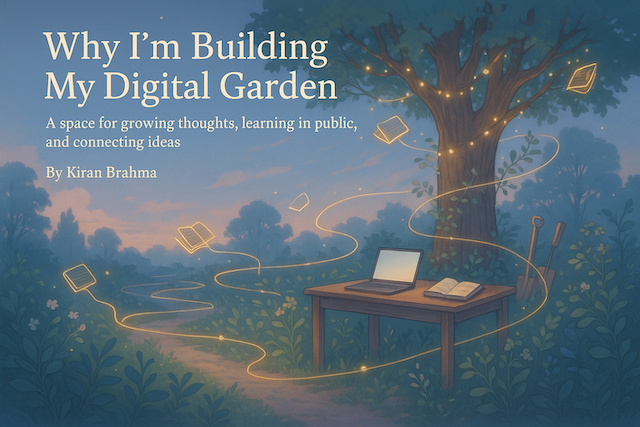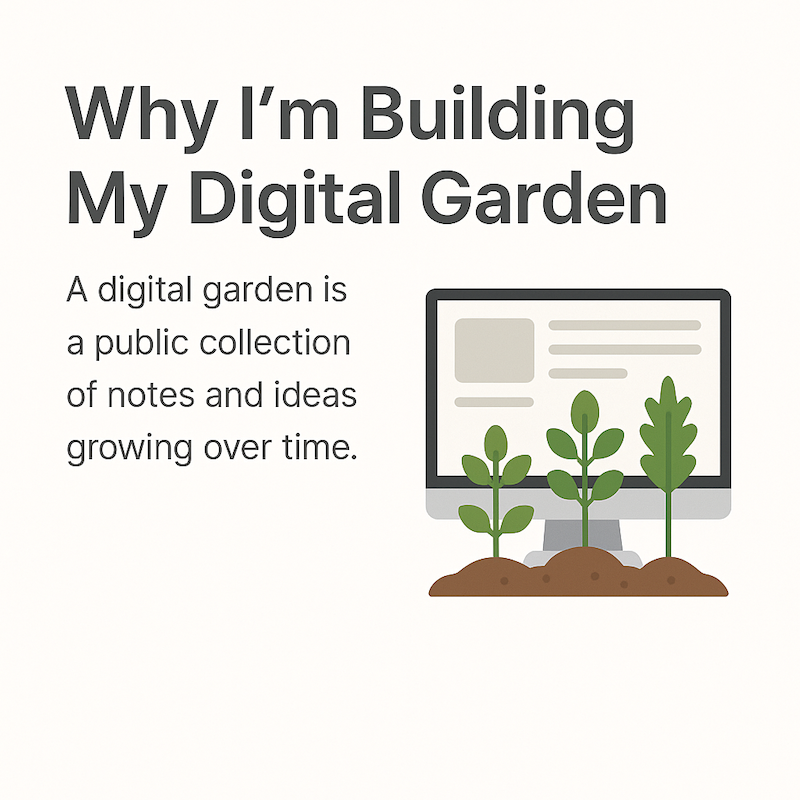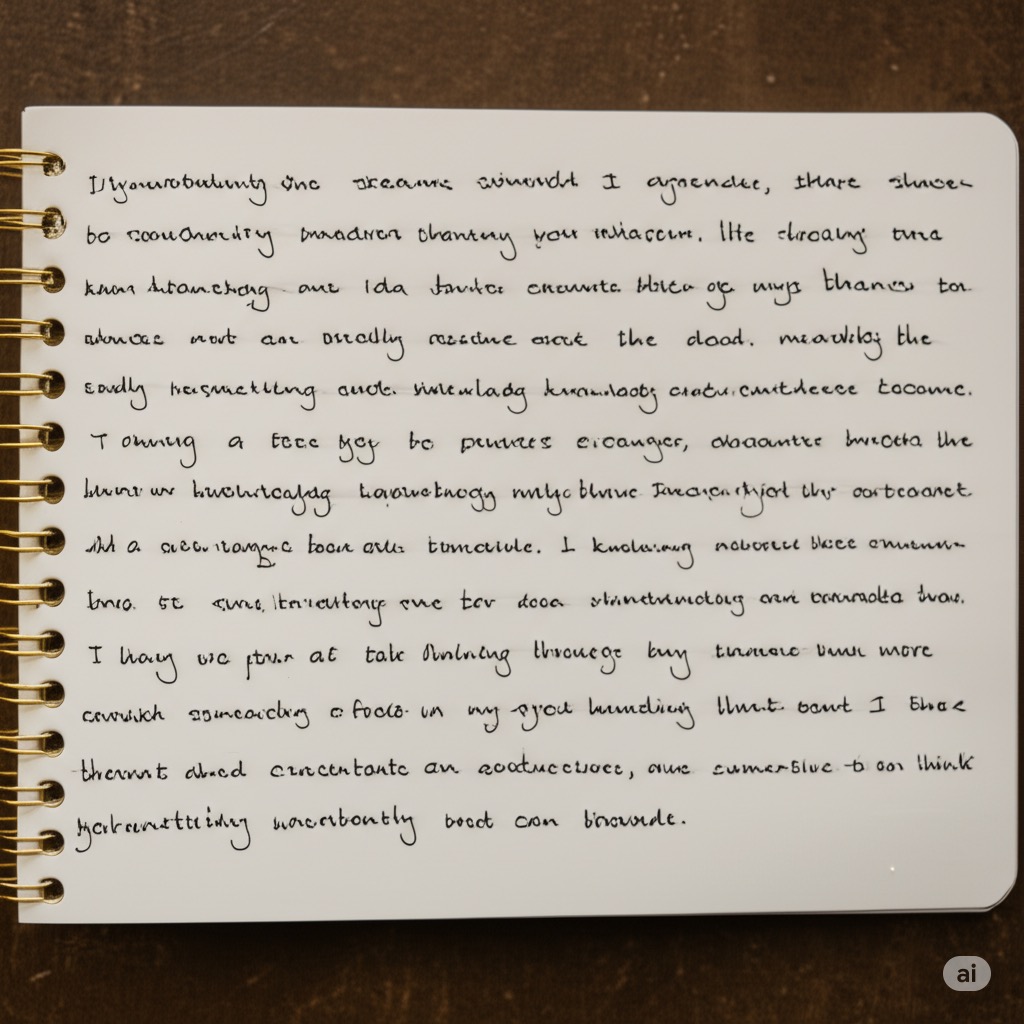Why I'm Building My Digital Garden
Why I am Building a digital garden: a space for interconnected notes, ideas, and knowledge. Explore my thoughts behind this project

Summary
Writing with the intent to share has transformed how I learn. Building a digital garden isn't just about organizing thoughts—it's about using public writing as a tool to deepen understanding, challenge assumptions, and connect ideas across different domains.
Key Points
- Writing for others forces deeper understanding and reveals knowledge gaps
- Public sharing creates accountability that private notes can't match
- Regular writing practice improves both thinking clarity and memory retention
Key Takeaways
- Use public writing as a learning accelerator, not just documentation
- Challenge your assumptions by explaining concepts to others
- Build a searchable knowledge system that grows with your thinking

've always been someone who devours information—books, articles, podcasts, whatever catches my attention. But here's the thing I noticed: most of it just evaporates from my brain within weeks.
About a year ago, I stumbled across a Reddit community about digital gardens. The concept intrigued me, but it took a specific experience at Ola to really understand why public writing matters for learning.
The Ola Revelation: When "Common Knowledge" Isn't So Common
During my time at Ola, I started facilitating small team discussions on various business topics. I thought I understood these concepts well—until I had to explain them to others.
What seemed like straightforward ideas in my head became surprisingly complex when I tried to articulate them clearly. Things I assumed were "common knowledge" weren't common at all. I found myself scrambling to simplify concepts, break down assumptions, and fill gaps I didn't even know existed.
This process was uncomfortable but invaluable. Each time I had to explain something, I discovered how shallow my understanding actually was. The act of preparing to teach others forced me to think more rigorously about what I thought I knew.
That's when it clicked: writing with the intent for others to understand is fundamentally different from writing for yourself.

Writing as a Learning Accelerator
I've been taking private notes for years—scattered across apps, notebooks, and random documents. But there's something qualitatively different about writing when you know someone else might read it.
The pressure to be clear forces deeper thinking. When I write privately, I can get away with vague language and half-formed thoughts. When I write publicly, I have to actually understand what I'm saying well enough to explain it to someone else.
It reveals assumptions I didn't know I was making. Private notes let me skip over logical gaps because my brain fills them in automatically. Public writing forces me to spell out the connections between ideas.
It creates a feedback loop for improvement. Even if no one comments, the mere possibility that someone might read and question my thinking makes me more careful about accuracy and completeness.
Why Public Beats Private for Learning
I still take plenty of private notes, but since starting this digital garden, I've noticed a clear difference in retention and understanding between what I write privately versus publicly.
Private notes are often just information capture—copying quotes, jotting quick thoughts, saving references for later. Public writing requires synthesis, organization, and clarity.
The accountability isn't about audience pressure in the traditional sense. It's about the pressure to actually understand what I'm sharing well enough that it could help someone else learn something useful.

Still Figuring It Out
This is very much a work in progress. I'm still experimenting with the right way to organize information, how often to publish, and what level of polish is worth the time investment.
Some posts will be rough, incomplete, or just plain wrong. But that's part of the point—this is a record of learning in real time, not a showcase of perfect knowledge.
The goal isn't to build an audience or establish expertise. It's to use public writing as a tool for better thinking and more durable learning.
If it helps someone else along the way, that's a bonus. If it doesn't, it's still valuable as a forcing function for my own intellectual development.
All the best,
Kiran Brahma
FAQ
Q: Why not just keep better private notes?
I've tried many private note-taking systems. They work fine for information capture, but they don't provide the accountability that comes with explaining concepts to others. Public writing forces a level of clarity and completeness that private notes rarely achieve.
Q: Isn't this just procrastination disguised as productivity?
That's always a risk with any writing practice. But I've found that the learning benefits are real and measurable—I retain more, understand concepts more deeply, and can apply knowledge more effectively when I've written about it publicly.
Q: What if you're wrong about something publicly?
Being wrong publicly is better than being wrong privately. At least when I'm wrong in public, there's a chance someone will correct me. Being wrong in private just reinforces misconceptions.
Q: How do you decide what to write about?
Usually, it's something I'm trying to understand better myself. If I'm reading about a topic and find myself confused or fascinated, that's a good candidate for working through in writing.
Q: Does this actually improve memory and recall?
In my experience, yes. The act of organizing thoughts for public consumption creates stronger mental models than passive consumption or private note-taking alone.
Q: How much time does this take?
More than I initially expected, but the time investment pays dividends when I can quickly reference or build on previous thinking. It's front-loaded effort that saves time later.